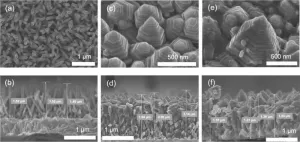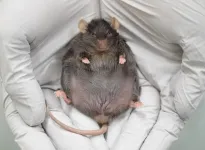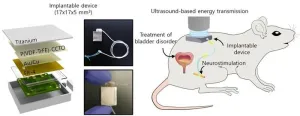(Press-News.org) Breakthrough could dramatically cut the use of pesticides and unlock other opportunities to bolster plant health
Scientists have engineered the microbiome of plants for the first time, boosting the prevalence of ‘good’ bacteria that protect the plant from disease.
The findings published in Nature Communications by researchers from the University of Southampton, China and Austria, could substantially reduce the need for environmentally destructive pesticides.
There is growing public awareness about the significance of our microbiome – the myriad of microorganisms that live in and around our bodies, most notably in our guts. Our gut microbiomes influence our metabolism, our likelihood of getting ill, our immune system, and even our mood.
Plants too host a huge variety of bacteria, fungi, viruses, and other microorganisms that live in their roots, stems, and leaves. For the past decade, scientists have been intensively researching plant microbiomes to understand how they affect a plant’s health and its vulnerability to disease.
“For the first time, we’ve been able to change the makeup of a plant’s microbiome in a targeted way, boosting the numbers of beneficial bacteria that can protect the plant from other, harmful bacteria,” says Dr Tomislav Cernava, co-author of the paper and Associate Professor in Plant-Microbe Interactions at the University of Southampton.
“This breakthrough could reduce reliance on pesticides, which are harmful to the environment. We’ve achieved this in rice crops, but the framework we’ve created could be applied to other plants and unlock other opportunities to improve their microbiome. For example, microbes that increase nutrient provision to crops could reduce the need for synthetic fertilisers.”
The international research team discovered that one specific gene found in the lignin biosynthesis cluster of the rice plant is involved in shaping its microbiome. Lignin is a complex polymer found in the cell walls of plants – the biomass of some plant species consists of more than 30 per cent lignin.
First, the researchers observed that when this gene was deactivated, there was a decrease in the population of certain beneficial bacteria, confirming its importance in the makeup of the microbiome community.
The researchers then did the opposite, over-expressing the gene so it produced more of one specific type of metabolite – a small molecule produced by the host plant during its metabolic processes. This increased the proportion of beneficial bacteria in the plant microbiome.
When these engineered plants were exposed to Xanthomonas oryzae – a pathogen that causes bacterial blight in rice crops, they were substantially more resistant to it than wild-type rice.
Bacterial blight is common in Asia and can lead to substantial loss of rice yields. It’s usually controlled by deploying polluting pesticides, so producing a crop with a protective microbiome could help bolster food security and help the environment.
The research team are now exploring how they can influence the presence of other beneficial microbes to unlock various plant health benefits.
Microbiome homeostasis on rice leaves is regulated by a precursor molecule of lignin biosynthesis is published in Nature Communications and is available online.
Contact
Steve Williams, Media Relations, University of Southampton press@soton.ac.uk or 023 8059 3212.
Notes for editors
Microbiome homeostasis on rice leaves is regulated by a precursor molecule of lignin biosynthesis is published in Nature Communications and is available here: https://www.nature.com/articles/s41467-023-44335-3
For Interviews with Dr Tomislav Cernava please contact Steve Williams, Media Relations, University of Southampton press@soton.ac.uk or 023 8059 3212.
Image: Rice paddies in China. Credit: Houxiang Kang
Additional information
The University of Southampton drives original thinking, turns knowledge into action and impact, and creates solutions to the world’s challenges. We are among the top 100 institutions globally (QS World University Rankings 2023). Our academics are leaders in their fields, forging links with high-profile international businesses and organisations, and inspiring a 22,000-strong community of exceptional students, from over 135 countries worldwide. Through our high-quality education, the University helps students on a journey of discovery to realise their potential and join our global network of over 200,000 alumni. www.southampton.ac.uk
www.southampton.ac.uk/news/contact-press-team.page
Follow us on X: https://twitter.com/UoSMedi
END
Scientists engineer plant microbiome for the first time to protect crops against disease
Breakthrough could dramatically cut the use of pesticides and unlock other opportunities to bolster plant health
2024-01-04
ELSE PRESS RELEASES FROM THIS DATE:
Chiba University is pleased to announce the International Conference: “Humanities In The Age Of Space Exploration”
2024-01-04
Introduction to the Event: As the world witnesses rapid technological advancements and the increasing reality of space travel and habitation, Chiba University is taking the lead in shaping the dialogue on the future of space development and humanity. The upcoming conference will feature distinguished speakers from Chiba University and international institutions, converging to facilitate interdisciplinary discussions. Through diverse lenses encompassing philosophy, ethics, law, political science, and horticulture, the conference aims to gain profound insights, welcoming active ...
US study offers a different explanation why only 36% of psychology studies replicate
2024-01-04
In light of an estimated replication rate of only 36% out of 100 replication attempts conducted by the Open Science Collaboration in 2015 (OSC2015), many believe that experimental psychology suffers from a severe replicability problem.
In their own study, recently published in the open-access peer-reviewed scientific journal Social Psychological Bulletin, Drs Brent M. Wilson and John T. Wixted at the University of California San Diego (USA) suggest that what has since been referred to as a “replication crisis” might not be as bad as it seems.
“No one asks a critical question,” the scientists argue, “if ...
Development of zinc oxide nanopagoda array photoelectrode
2024-01-04
Overview
A research team consisting of members of the Egyptian Petroleum Research Institute and the Functional Materials Engineering Laboratory at the Toyohashi University of Technology, has developed a novel high-performance photoelectrode by constructing a zinc oxide nanopagoda array with a unique shape on a transparent electrode and applying silver nanoparticles to its surface. The zinc oxide nanopagoda is characterized by having many step structures, as it comprises stacks of differently sized hexagonal prisms. In addition, it exhibits very few crystal defects and excellent electron conductivity. By decorating its surface with silver nanoparticles, the zinc oxide nanopagoda ...
Vitamin discovered in rivers may offer hope for salmon suffering from thiamine deficiency disease
2024-01-04
CORVALLIS, Ore. – Oregon State University researchers have discovered vitamin B1 produced by microbes in rivers, findings that may offer hope for vitamin-deficient salmon populations.
Findings were published in Applied and Environmental Microbiology.
The authors say the study in California’s Central Valley represents a novel piece of an important physiological puzzle involving Chinook salmon, a keystone species that holds significant cultural, ecological and economic importance in the Pacific Northwest and Alaska.
Christopher ...
An electrophysiological breakthrough for diabetic brain studies
2024-01-04
Overview
A research team from the Institute for Research on Next-generation Semiconductor and Sensing Science (IRES²) at the Toyohashi University of Technology, National Institute of Technology, Ibaraki College, and TechnoPro R&D Company has successfully demonstrated low-invasive neural recording technology for the brain tissue of diabetic mice. This was achieved using a small needle-electrode with a diameter of 4 µm. Recording neuronal activity within the diabetic brain tissue is particularly challenging due to various complications, including the development of cerebrovascular disease. Because of the significant advantage of the miniaturized needle-electrode compared to conventional ...
Using static electricity to enhance biomedical implant durability
2024-01-04
Medical technology innovations achieved by integrating science and medicine have improved the quality of life for patients. Especially noteworthy is the emergence of electronic devices implanted in the body, such as in the heart or brain, which enable real-time measurement and regulation of physiological signals, presenting new solutions for challenging conditions like Parkinson's disease. However, technical constraints have hindered the semi-permanent use of electronic devices after their implantation.
A collaborative research team led by Professor Sung-Min Park from the Departments of Convergence IT Engineering, Mechanical Engineering, and ...
Hearing aids may help people live longer
2024-01-04
LOS ANGELES — Hearing loss affects approximately 40 million American adults, yet only one in 10 people who need hearing aids use them, research shows.
Those who don’t use hearing aids but should may want to make wearing them one of their New Year’s resolutions, according to a new study from Keck Medicine of USC published today in The Lancet Healthy Longevity.
“We found that adults with hearing loss who regularly used hearing aids had a 24% lower risk of mortality than those who never wore them,” ...
Surgical teams put on notice for poor behaviour
2024-01-04
Australian researchers have successfully trialled a novel experiment to address offensive and rude comments in operating theatres by placing ‘eye’ signage in surgical rooms.
The eye images, attached to the walls of an Adelaide orthopaedic hospital’s operating theatre without any explanation, had the desired effect in markedly reducing poor behaviour among surgical teams.
Lead researcher University of South Australia Professor Cheri Ostroff attributed the result to a perception of being “watched”, even though the eyes were not real.
The three-month experiment ...
The Avocado Debate: a polarizing fruit and its impact on society
2024-01-04
The avocado has soared to unprecedented heights of popularity, gracing the plates of toast enthusiasts and health-conscious individuals worldwide. But what are the overlooked consequences of our latest food obsession?
“The avocado has come to represent so much more than just a fruit. It’s wrapped up with ideas of generational conflict, environmental chaos and social injustice. Over the last century, through careful marketing, it has evolved into a commodity crop with a huge social media following.” says Honor May Eldridge, a food policy expert who works to promote sustainable agriculture around the ...
Jonathan Stamler, MD, named fellow of the 2023 National Academy of Inventors
2024-01-03
CLEVELAND, Ohio – Jonathan Stamler, MD, has been named a Fellow of the National Academy of Inventors (NAI). Dr. Stamler is the co-founder and president of Harrington Discovery Institute at University Hospitals (UH), and the Robert S. and Sylvia K. Reitman Family Foundation Distinguished Professor of Cardiovascular Innovation at the Case Western Reserve University School of Medicine.
Election as an Academy Fellow is the highest professional distinction awarded solely to inventors and the 2023 Class of Fellows ...
LAST 30 PRESS RELEASES:
Alkali cation effects in electrochemical carbon dioxide reduction
Test platforms for charging wireless cars now fit on a bench
$3 million NIH grant funds national study of Medicare Advantage’s benefit expansion into social supports
Amplified Sciences achieves CAP accreditation for cutting-edge diagnostic lab
Fred Hutch announces 12 recipients of the annual Harold M. Weintraub Graduate Student Award
Native forest litter helps rebuild soil life in post-mining landscapes
Mountain soils in arid regions may emit more greenhouse gas as climate shifts, new study finds
Pairing biochar with other soil amendments could unlock stronger gains in soil health
Why do we get a skip in our step when we’re happy? Thank dopamine
UC Irvine scientists uncover cellular mechanism behind muscle repair
Platform to map living brain noninvasively takes next big step
Stress-testing the Cascadia Subduction Zone reveals variability that could impact how earthquakes spread
We may be underestimating the true carbon cost of northern wildfires
Blood test predicts which bladder cancer patients may safely skip surgery
Kennesaw State's Vijay Anand honored as National Academy of Inventors Senior Member
Recovery from whaling reveals the role of age in Humpback reproduction
Can the canny tick help prevent disease like MS and cancer?
Newcomer children show lower rates of emergency department use for non‑urgent conditions, study finds
Cognitive and neuropsychiatric function in former American football players
From trash to climate tech: rubber gloves find new life as carbon capturers materials
A step towards needed treatments for hantaviruses in new molecular map
Boys are more motivated, while girls are more compassionate?
Study identifies opposing roles for IL6 and IL6R in long-term mortality
AI accurately spots medical disorder from privacy-conscious hand images
Transient Pauli blocking for broadband ultrafast optical switching
Political polarization can spur CO2 emissions, stymie climate action
Researchers develop new strategy for improving inverted perovskite solar cells
Yes! The role of YAP and CTGF as potential therapeutic targets for preventing severe liver disease
Pancreatic cancer may begin hiding from the immune system earlier than we thought
Robotic wing inspired by nature delivers leap in underwater stability
[Press-News.org] Scientists engineer plant microbiome for the first time to protect crops against diseaseBreakthrough could dramatically cut the use of pesticides and unlock other opportunities to bolster plant health







